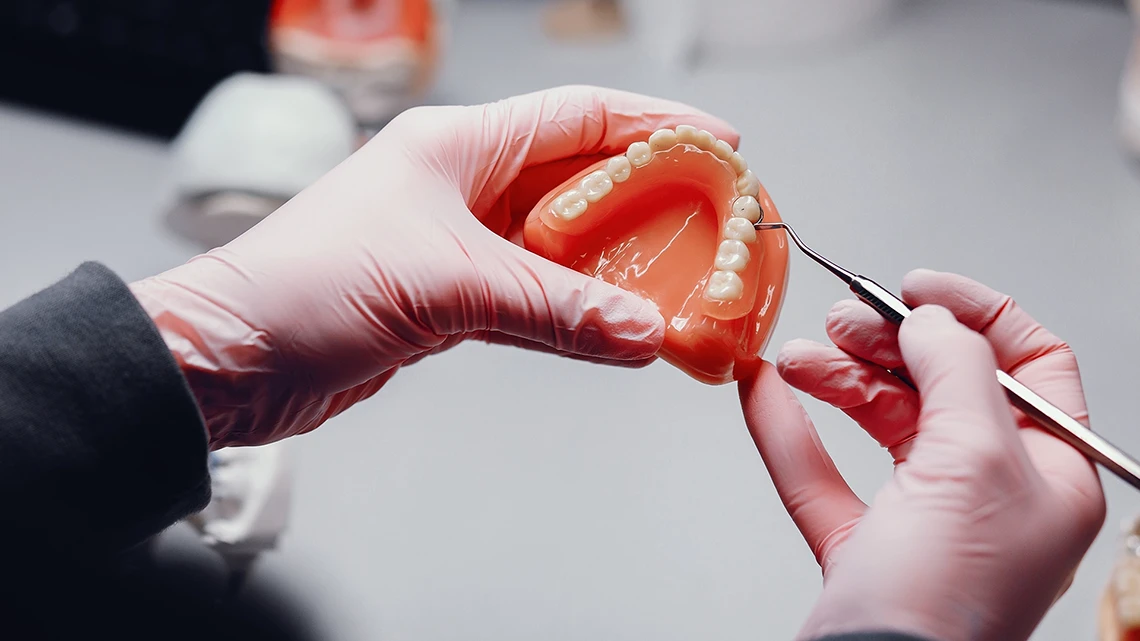What is Dental Prosthesis?
Dental prosthesis is a treatment option consisting of artificial teeth placed in place of missing teeth for individuals who have lost teeth. Prostheses compensate for tooth loss, restore chewing function, and improve smile aesthetics. Dental prostheses are suitable for conditions such as complete tooth loss, partial tooth loss, or multiple missing teeth. With different types and application methods, they can be customized to meet patients’ needs.
What are the Advantages of Dental Prostheses?
- Excellent Tooth Function: Allows easy chewing, similar to natural teeth.
- Attractive Smile: Provides aesthetically pleasing results.
- Increased Self-Confidence: Renewing your smile boosts your self-confidence.
- Comfortable Use: Does not cause any discomfort in daily life.
- Comprehensive Solution: Offers a permanent solution to tooth loss problems.
- Healthy Mouth: Improves and protects your dental health.
- Long-lasting Durability: Provides trouble-free use for many years with high-quality materials.
Who is Suitable for Dental Prostheses?
- Those Who Have Lost Teeth: A perfect solution for missing teeth.
- Those Struggling with Chewing: Provides the ability to chew comfortably.
- Those Seeking an Aesthetic Smile: An ideal option for a beautiful smile.
- Those with Dental Health Problems: Keeps your teeth healthy and strong.
- Children, Teenagers, or Adults: People of all ages who have functional or aesthetic issues with their teeth.
- Candidates for Other Dental Treatments: Can be applied in combination with other treatments.
- Those Looking to Improve Their Quality of Life: Provides comfort and self-confidence in daily life.
What are the Types of Dental Prostheses?
Dental prostheses cater to different needs with various types. Complete prostheses are used in cases of complete tooth loss, while partial prostheses are placed only in place of missing teeth. Other options include fixed prostheses and implant-supported prostheses. Each one is applied with personalized treatment plans based on the individual’s specific needs.
How is it Applied?
Initial Assessment and Planning:The treatment process begins with a comprehensive evaluation of your oral structure and dental health. After assessing the condition of your teeth, the need for prostheses, and your overall oral health, a customized treatment plan is developed.
Tooth Monitoring and Measurement:Measurements are taken from existing teeth or implants for the prostheses that will be placed in place of missing teeth. This measurement is crucial for ensuring the prostheses fit correctly and align perfectly with your oral structure.
Prosthesis Design and Manufacturing:With the measurements taken, a custom prosthesis design is made based on your personal needs. The design is carefully planned to achieve the most aesthetically and functionally suitable results. The manufactured prosthesis is shaped to resemble your natural teeth.
Prosthesis Placement:The designed prosthesis is carefully placed to ensure a proper fit in your mouth. It is fixed in alignment with your gums. The proper placement of the prosthesis is checked during the initial placement.
Check-up and Adjustment:After the prosthesis is placed, necessary adjustments are made until comfort and fit are achieved. This process is important for ensuring the prosthesis fits perfectly and provides long-term comfort. A few follow-up appointments after the application help ensure that the prosthesis can be used comfortably.
Will There Be Pain or Discomfort?
Generally, there is no pain felt during dental prosthesis treatments. Local anesthesia is used during the procedure to block any pain in the area. After the prostheses are placed, mild discomfort may be experienced, but this is usually short-lived and disappears over time.
How Long Does the Treatment Take?
The treatment process for dental prostheses can range from 1 day to several weeks. During the first appointment, mouth measurements are taken, while the design and manufacturing of the prosthesis can take a few days. Follow-up appointments are necessary for the placement and adjustment of the prosthesis.
How Many Days for Recovery?
The recovery process varies depending on personal factors and the type of application. However, generally, prostheses adapt fully within 7-10 days. During this time, mild sensitivity may be experienced in the mouth.
What are the Prices of Dental Prosthesis Treatment?
The prices of dental prostheses vary depending on the material used and the type of prosthesis. Implant-supported prostheses may be more expensive than traditional prostheses. Prices are also customized according to the treatment process and the patient’s needs.
Why Dr. Terziler Exclusive Clinic?
Dr. Terziler offers personalized solutions with his globally recognized expertise and aesthetic approach that combines art and science, providing not only a physical but also an emotional transformation. Our clinic, equipped with advanced technologies and operating based on comfort and security, adopts perfection as its corporate philosophy. Because here, every touch aims for your holistic health and happiness.















